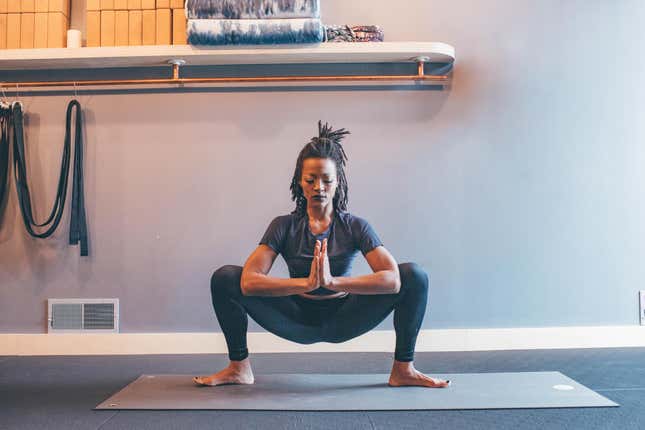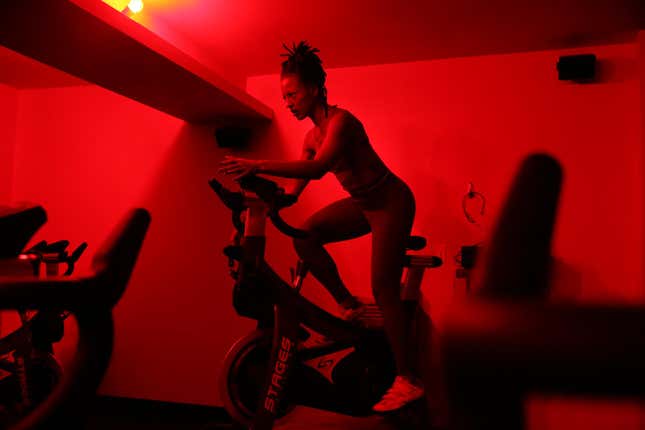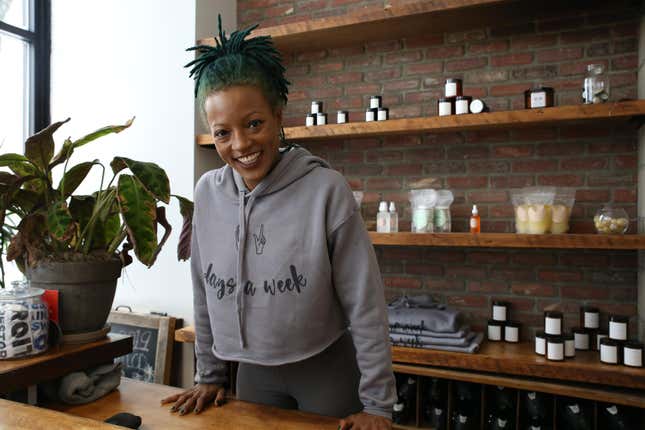
DETROIT—Detroit is the blackest city in America. And in this black city exists a black-ass yoga studio where you can be your black-ass self. Amina Daniels, the owner and founder, works hard to keep it that way. Live Cycle Delight, located in Detroit’s gentrifying West Village neighborhood, has two spaces: one where the yoga classes take place and the other, a two-floor structure, where she and other instructors teach TRX (total resistance exercises, a specialized form of suspension training that utilizes equipment developed by former U.S. Navy SEAL Randy Hetrick), kettlebell and indoor cycling courses.
Back in November, I decided to do a “Rise and Ride” cycling class, kettlebell, and hot yoga class all in one day. Yeah, I know, I’m crazy but Amina appreciated my drive nonetheless.
I woke up at 5:30 a.m. and took an Uber to my 6:15 a.m. “rise and ride” class, where strapping the biking shoes on to the petals proved to be the toughest part of the hourlong session. Another student helped me set my feet on the petals as if she were teaching a 5-year-old how to ride a bike down the street. Most of the students in the class are regulars and they exchanged greetings as trap music—cuss words, “nigga” and all—blared over the sound system. I liked that. Roughly half of the students were white, but the space didn’t accommodate their sensitivities at the expense of us.
It was 6:15 a.m., and Amina was all business. She said hello when she walked briskly into the room, checked in with everyone and let us know it was time to get started. “Suge” played and Amina took us through a circuit of hills, inclines and sprints. She gave some of us nicknames. Mine was “Brooklyn,” even though I grew up in Detroit.
“Come on Brooklyn!” she yelled as I pushed through the hill portion of the circuit.
As hard as the cycling was, I felt a sense of belonging, as if the gentrifying neighborhood where I was taking this class had something for me. For black people. If you wanna keep it one hundred, the facility is top-notch and you really don’t see too many places like it outside of the white suburbs or in downtown Detroit, which is becoming more hostile to black Detroiters—who make up some 80 percent of the city’s population—by the day.

After the Rise and Ride class, I walked outside in the common area and found several tables with black business owners selling their skincare products. At the front desk, students talked about politics and race. Again, half of the students were white, but the space centered blackness.
I asked Amina how she came up with the idea of combining cycling, TRX, kettlebells and yoga in once space. She said she’d always wanted to create a fitness space in Detroit that was as good as anything in the suburbs, but much of it had to do with not feeling comfortable in predominantly white fitness spaces.
“I always wanted to be a community-centered boutique fitness studio,” she told me. “I spent years driving to places in suburban areas where people didn’t want me to be there and I paid top dollar. People would have an attitude if they needed to move your mat. You can speak to people that wouldn’t speak back to you. I also worked in some of the suburban studios where I took classes and people acted like they didn’t care if you were there or not. We all know what it’s like to be not included. I mean, if you don’t look a certain way, and that’s why fitness should be accessible to all. It shouldn’t be something that is exclusive, and we all should be able to have access to a place that’s nice.”
By the way, Live Cycle Delight is ridiculously affordable. You can pay $999 for a full year and take unlimited classes. (there are other affordable payment options, of course.) By any measure, that’s a great deal. I pay $139.99 per month just for yoga classes at my Brooklyn studio.
Many of the students, whose ages range from early 20s to 60s, attended black schools. Amina, also a Detroit native, finished Clark Atlanta University in January of 2008. She didn’t run track in college, but she did compete in the 100 and 200 meters in AAU and USATF. After graduation, she moved to New York City, where she lived for six years, managing flagship retail stores and launching a podcast network.

She grew tired of the retail market, though. Opportunities eluded her. People she brought into the company were promoted over her. As the only senior-level manager of color who was black, she felt isolated and wanted a change. Her friends back home told her that there were programs in the city for entrepreneurs like her.
So, in August 2013, she packed her rental car and drove to Detroit with a friend.
“I just said that I was going to open up a fitness studio in Detroit with my meager 401(k), and I was going to make it happen,” she told me.
She started working at LA Fitness in nearby Royal Oak to get a better understanding of the fitness landscape. Then, a setback happened. Two months after moving back home, Amina was struck by a car while biking through Detroit’s Midtown, having gotten used to biking in New York City instead of taking the train. She spent the next two and a half years in and out of physical therapy, including three surgeries on her ankle.
“I’ve had my Achilles repaired,” she said. “I’ve had hardware put in, I’ve had hardware removed. I have a non-working patella, and I still need another ankle surgery. However, I don’t really have time for that. So I do a lot of yoga and acupuncture. And so while I was in and out of physical therapy, I was working. I got another job being a store manager of the Motown Museum, although that’s not what I wanted to do. But then when I needed to have another surgery, I wasn’t able to work.”
Still, she managed to work as a personal assistant to generate money while working towards building her studio. After she completed Retail Boot Camp at TechTown in 2014, Amina’s first opportunity at a business investment didn’t work in her favor. She says the sponsors told her they wanted SoulCycle, but were concerned she would not be able to teach classes because of the boot on her foot.
“I said, ‘What are you guys talking about? I’m going to be out the boot. I’m like, Steph Curry, I’m going to heal. It’s going to be good. I’m an athlete.’ They were like, ‘No.’”
Undeterred, she kept at it and won a $50,000 grant in the Hatch Detroit competition for up-and-coming entrepreneurs in 2015 and became yoga certified a year later. After going through a very challenging time of finding real estate in the city, she closed a deal on the West Village space where she is now.
“I spent two years of people telling me I can’t do this,” Amina said. “And then flash forward to 2019. Since I have opened my studio, there have been three cycle studios that have opened around me because I’ve made it look so easy, even though it was not easy.”
Amina’s story is a lesson in how black female entrepreneurs aren’t given the benefit of the doubt, are often doubted yet still find a way to realize their dreams so that the community can benefit.
After an hour of kettlebells, I rushed down the opposite side of Van Dyke Road, where the yoga studio is located, to practice an hour of Vinyasa yoga. As I have written before, I take my yoga mat with me when I travel the nation for my work as a political reporter. I always look for black-owned studios because black-owned spaces tend to feel like the safest spaces for me. Yoga is supposed to feel safe. Yoga is supposed to make you feel like you are cared for and that your body is secure.
At Live Cycle Delight, here were 10 or so students, most of whom were black, in class with me as our instructor took us through the movements. In black Detroit, there is a space where black people can move freely and feel free and become yogis.
A black woman endured racism, injuries and gentrification so we could all Namaste.

